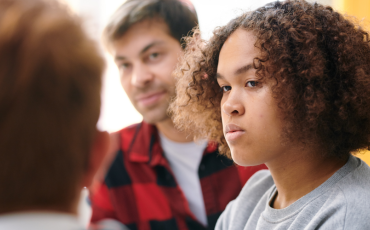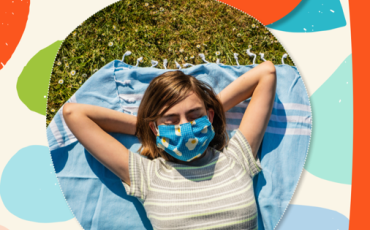'Mental health shapes my life': COVID-19 & kids' wellbeing (2022)

Throughout the COVID-19 pandemic, children and their families have experienced unparalleled disruptions to their daily lives. Although the pandemic is far from over, it is important that we understand how children have dealt with these changes and ensure that policy and decision making moving forward can minimise negative impacts.
You can view a Child-friendly version of the report here.
In 2021, the National Mental Health Commission asked Australia’s National Children’s Commissioner, Anne Hollonds, to examine the impacts of the COVID-19 pandemic on the mental health and wellbeing of children. The NMHC specifically asked the Commissioner to examine:
- the impacts of the pandemic on children in different circumstances and locations
- the mental health and related support and interventions required to support children, their families and communities
- the main and unique challenges and barriers experienced by children during the pandemic
- actions that can be taken to address the priority areas of the National Mental Health and Wellbeing Response Plan.
To capture these experiences felt by children and their families, the National Children’s Commissioner launched a national online survey for children and their parents/guardians and grandparents.
The survey gathered 4,559 responses from children aged 9-17 years and 2,796 responses from parents/guardians and grandparents. The respondents told us that:
Children across Australia experienced the pandemic in different ways, with variations in experiences of restrictions and levels of community infections across states and territories.
- 41% of children reported that the pandemic had a negative impact on their wellbeing, and at the time of the survey in early 2022, around one in five children reported that they were feeling more down, scared or worried than they used to. This was higher for children identifying as non-binary or other (54%) and girls (46%). Throughout the report, these groups reported higher negative outcomes than the general sample on several questions.
- The lack of social engagement and contact with extended family and their friends was a key concern for children. This extended to missing out on school, recreational activities and doing less sports—often as these were identified as environments for social engagement.
- Many children reported struggling with remote learning due to boredom, lack of learning supports, lack of structure, poor focus and inaccessibility to digital technologies to support their learning. Challenges were also commonly expressed by older students who felt more pressure on their studies. Nevertheless, some children reported positive experiences. They told us that the lack of distractions at home allowed for higher productivity, and that they enjoyed increased flexibility and independence.
- Children reported seeking help from family/friends significantly more than accessing formal services. Holistic support that responds to the needs of the whole family, rather than single family members seeking help would be better equipped to provide support to children.
In addition to the survey, the National Children’s Commissioner also engaged with stakeholders and held two roundtables with experts and stakeholders from key service providers to explore their experiences and knowledge of how children and families felt during the pandemic, and to discuss the findings of the survey.
This report captures these experiences and provides recommendations for the meeting the mental health and wellbeing needs of children affected by the COVID-19 pandemic in Australia. Each recommendation related to the priority areas of the National Mental Health and Wellbeing Pandemic Response Plan as well as to issues raised in the report.
The recommendations seek to make systemic changes in our approach towards children’s mental health and wellbeing in Australia, both in emergency situations and in post-pandemic Australia. What emerges clearly from this work (and that of others) is that children’s mental health and wellbeing was already a significant concern in Australia well before the pandemic.
The National Children’s Commissioner would like to thank all the children, young people, parents, carers and grandparents, who shared their experiences in the surveys. Thank you also to all the service providers and key stakeholders who provided advice for this report.
Seeking Support
Crisis and suicide prevention
- If you or someone else are in immediate danger call Triple Zero 000
- Lifeline: 13 11 14 or visit www.lifeline.org.au
Mental health support and advice
- Kids Helpline: 1800 55 1800 or visit www.kidshelpline.com.au
- Beyond Blue: 1300 22 4636 or visit www.beyondblue.org.au
- MensLine Australia: 1300 78 99 78 or visit www.mensline.org.au
Family and domestic violence support
- 1800Respect: 1800 737 732 or visit www.1800respect.org.au
Child sexual abuse support and advice
- BraveHearts Support Line: 1800 272 831 or visit www.bravehearts.org.au
Links and contact details for support services for parents and carers
- New South Wales: Parentline NSW on 1300 130 052 or visit https://www.parentline.org.au/
- Australian Capital Territory: Parentline ACT on (02) 6287 3833 or visit https://raisingchildren.net.au/_media/external-links/p/parentline-act
- Northern Territory: FACES Family Support Line on 1800 999 900 or visit https://tfhc.nt.gov.au/children-and-families/territory-faces
- Queensland: Parentline Queensland and Northern Territory on 1300 301 300 or visit https://parentline.com.au/
- South Australia: Parent Helpline South Australia on 1300 364 100 or visit https://humanrights.gov.au/our-work/commission-general/broken-link
- Tasmania: Parentline Tasmania on 1300 808 178 or visit https://humanrights.gov.au/our-work/commission-general/broken-link
- Victoria: Parentline Victoria on 132 289 or visit https://services.dffh.vic.gov.au/parentline
- Western Australia: Ngala Helpline on (08) 9368 9368 (metropolitan) or 1800 111 546 (regional callers) or visit https://www.ngala.com.au/service/ngala-parenting-line-2/



